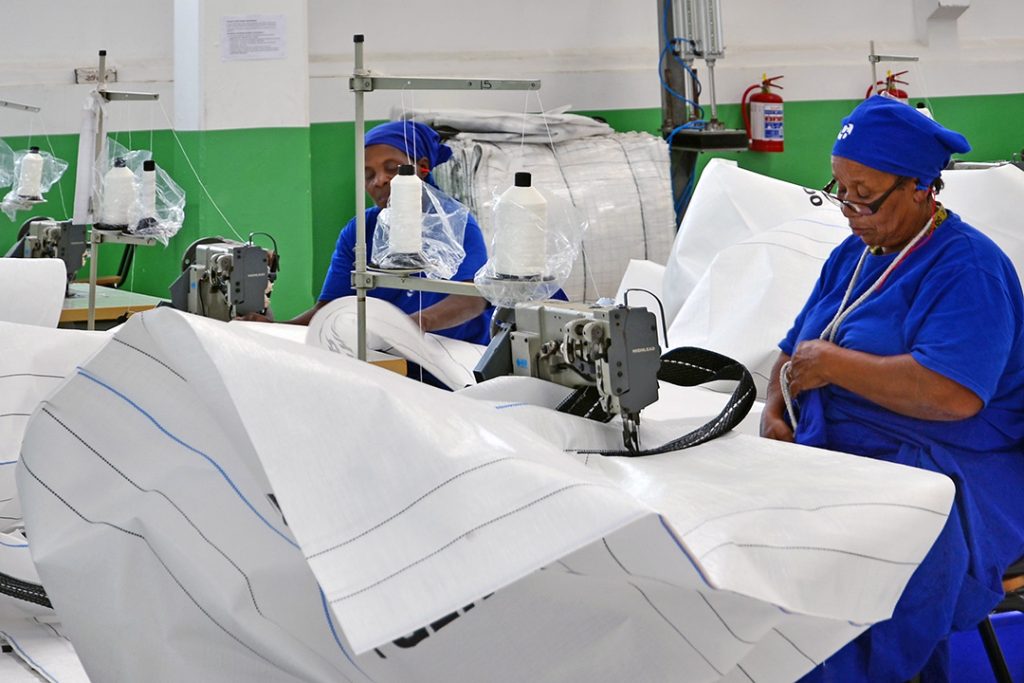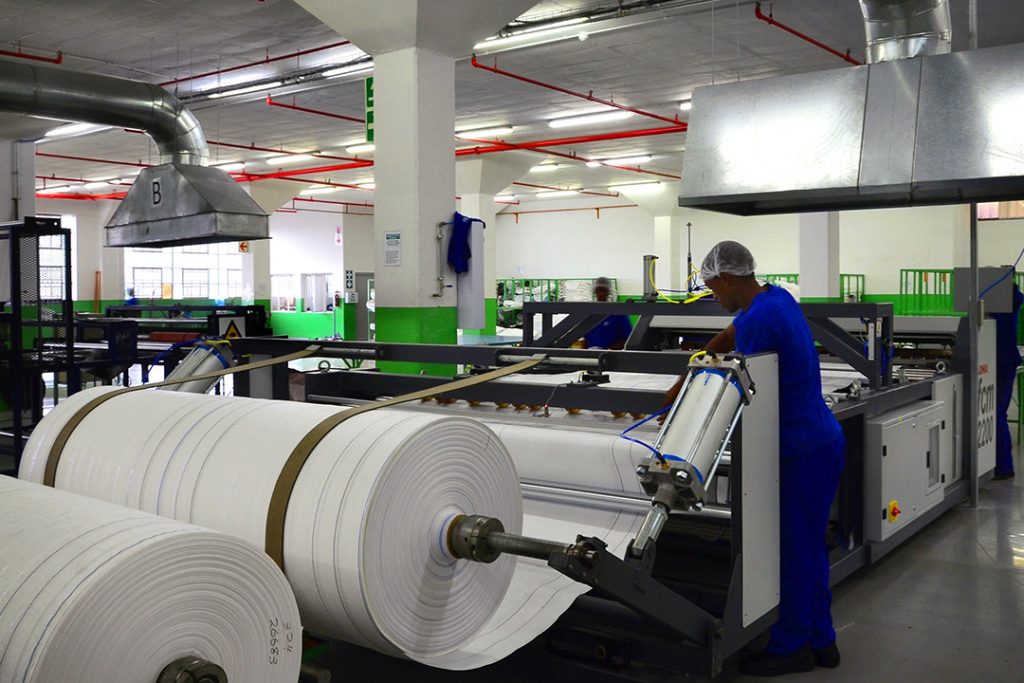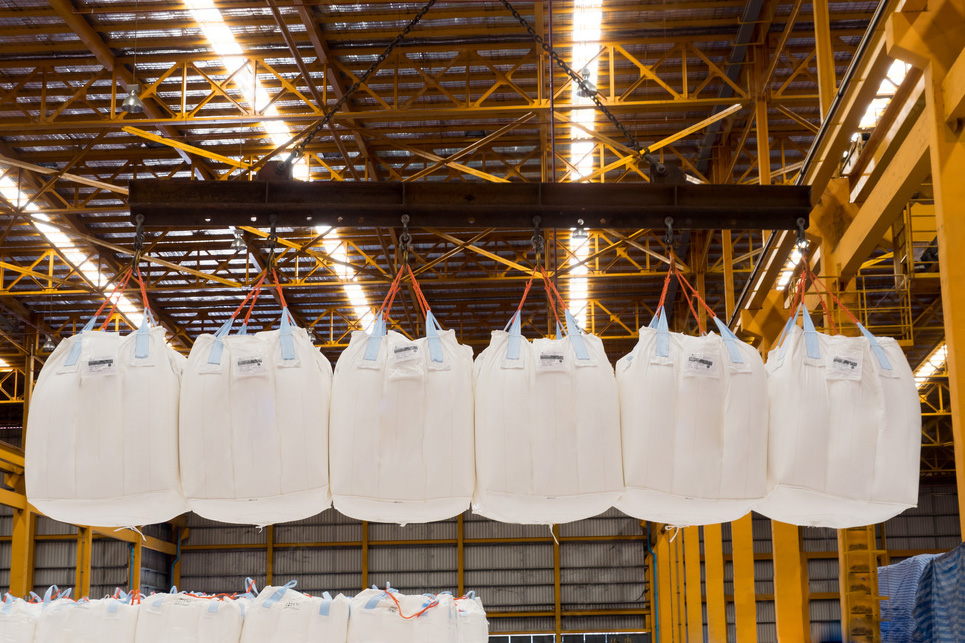Polypropylene is the most common material used in bulk bag manufacturing. Its unique flexibility, durability, and lightweight qualities make it excellent for producing strong bulk bags, also known as flexible intermediate bulk containers (FIBCs). These versatile containers serve an important role in carrying and storing a wide range of products in many sectors.
Bulk bags made of polypropylene are extremely flexible, allowing them to adjust to the shape of their contents and maximise storage space. This flexibility also allows for easier handling and filling than rigid containers. What’s more, polypropylene is extremely strong and tear-resistant, allowing bulk bags to bear large loads and handle stress without losing their integrity.
Custom Bulk Bags is a leading manufacturer and supplier of bulk bags in South Africa. We produce up to 3.5 million units per year and our products can safely hold between 500kg and two tonnes of material per bag. We offer several UN-certified designs and attachments, making our products fully customisable to meet your unique needs.

Woven vs non-woven polypropylene for bulk bags
Polypropylene bulk bags are substantially lighter than traditional packaging materials such as steel drums and wooden or cardboard crates. This minimises transportation expenses and makes handling easier during storage and transport.
There are two ways to manufacture polypropylene bulk bags: woven and non-woven. Understanding the distinctions between these methods is important for making informed decisions when purchasing bulk bags.
Woven polypropylene bags are made by interlacing and weaving polypropylene tapes or strips into a crisscross pattern. This method results in a strong, stable, and breathable fabric with excellent weight-bearing capacity. It’s the preferred method used by Custom Bulk Bags.
Non-woven polypropylene bags are made by heat bonding or chemically fusing the polypropylene fibres. This produces a flat, sheet-like material that is flexible and recyclable, but it lacks the structural integrity and strength of woven fabric.

Advantages of woven polypropylene fabric
When it comes to bulk packaging, woven polypropylene has several significant advantages over non-woven alternatives. Firstly, it offers greater strength and load-bearing capacity. Woven fabric has an interlocking structure that provides excellent strength and stability. Woven bulk bags can safely carry heavier loads than non-woven ones.
Woven material also has enhanced puncture resistance. The interlaced tapes tend to spread slightly and shift when something sharp presses against the fabric. This allows the bag to be pierced without causing too much damage to the fabric, and when the object is removed, the fabric can shift back into its original form. Non-woven fabric cannot do this.
Woven fabric also improves air circulation within the bag, which might be useful for some products. It helps to avoid moisture buildup and possible product deterioration. This fabric is extremely durable and reusable. It can resist repeated usage without losing its integrity, which results in long-term cost savings.

Woven polypropylene bulk bags are ideal for several South African industries
These versatile packaging solutions are already used in several sectors in South Africa, including the following:
- Agriculture – Woven bulk bags are commonly used to store and transport agricultural produce, such as grains, seeds, and vegetables. Their durability and breathability ensure these products can be handled safely without spoiling quickly.
- Construction – Builders and contractors use bulk bags to transport sand, cement, and gravel. Their strong design ensures that these materials can be easily moved around construction sites.
- Chemicals – Woven bulk bags are ideal for transporting chemicals, such as polymers, resins, and fertilisers. Their chemical and puncture resistance allows the safe and secure transportation of these potentially hazardous substances.
- Mining – Bulk bags are a common site on mines as they are used to transport minerals, ores, and other materials recovered from the ground. Their strength and durability allow them to handle large loads of ore.

Custom Bulk Bags offers high-quality woven bulk bags
We offer several designs of woven bulk bags that meet your specific needs. These products are backed by international certifications and quality control processes to ensure you receive world-class bulk bags. Our team can also help you navigate the selection process, ensuring that you get the best bag for your product type, weight capacity, and application.
In addition, we provide customised design choices, such as UN-certified bulk bags, as well as optional extras that make your bags more user-friendly and efficient. Custom Bulk Bags guarantees robust, durable, and reusable woven bulk bags that will contribute to your company’s success. For more information about our bulk bags or to get advice on the ideal designs, please contact us today.
___
Custom Bulk Bags is a leading South African manufacturer of woven polypropylene bags for various industries, such as mining, chemicals and food. We are able to produce over 3.5-million bulk bags per year, keeping our customers in stock at all times. Our bags adhere to the highest levels of quality as a result of our stringent in-house testing and quality control programmes.
Custom Bulk Bags holds ISO 9001 certification and we currently have a number of UN-certified designs. We are a Level 2 B-BBEE manufacturer and supplier and fall under the ownership structure of Deneb Investments Limited. For more information on our products, contact sales@custombulkbags.co.za. Follow us on Facebook, LinkedIn and Instagram for our latest news and industry insights.
